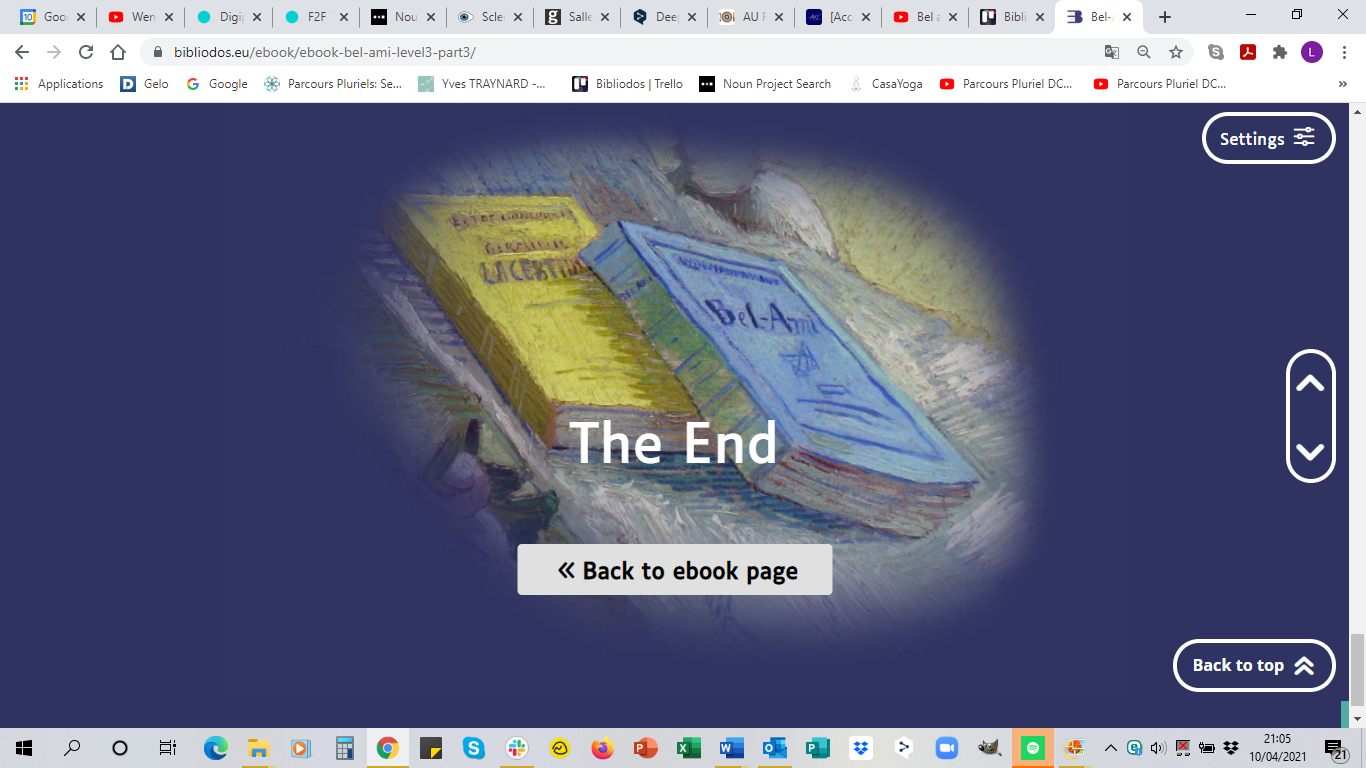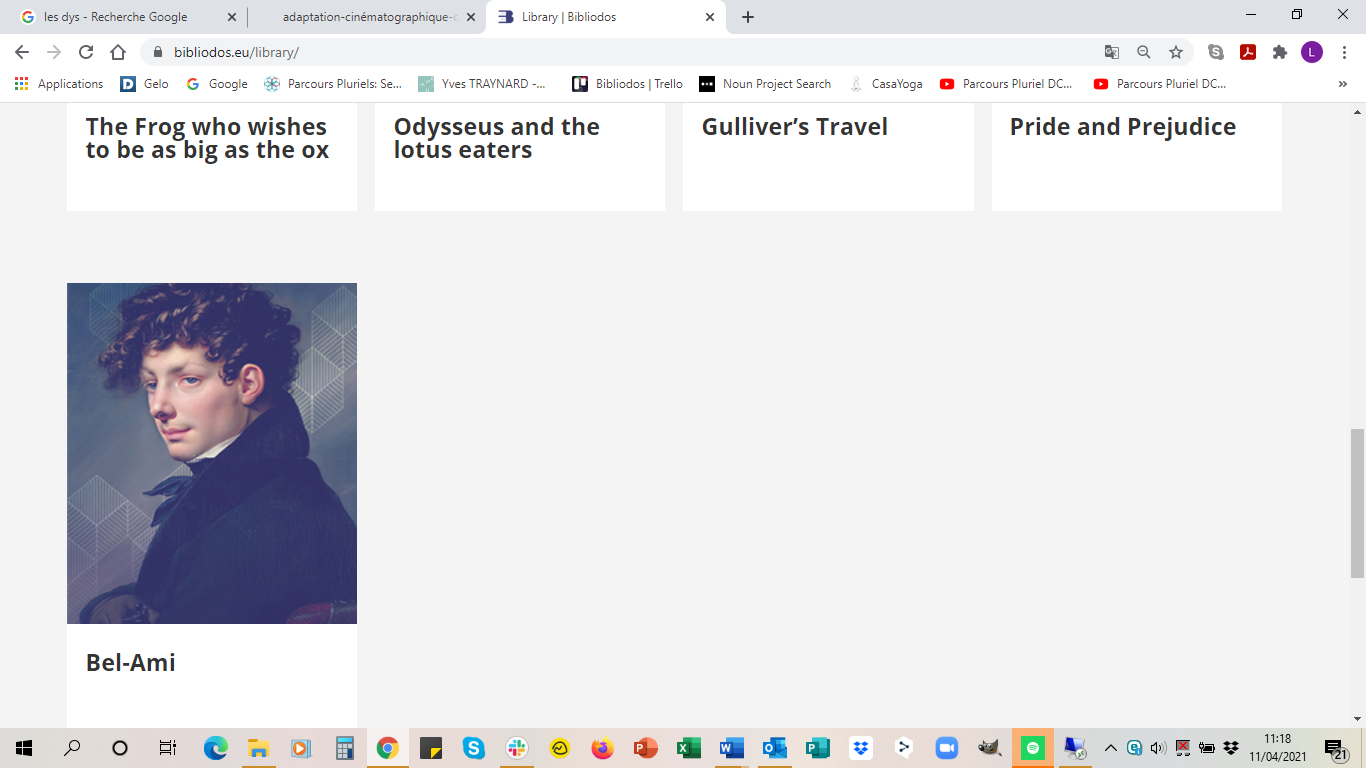Aims: This practice sheet offers teachers and educators teaching ideas to go further with an audience that is at ease with oral expression (B2 and above, or native speakers) in the discovery of a literary work.
Duration: The duration for acquaintance with the present Practice Sheet does not exceed 45 minutes to 1 hour.
Prior Knowledge: You must know the CEFR and can also read the following practical sheets:
- Target audience and reading levels
- Designing your workshop for students with SLDs
- How to approach a story board and an eBook when you have a DYS
- How to adapt an eBook to the needs of learners with SLD
- Workshop for non reading audience
It is also important to understand the concepts of illiteracy and aliteracy and be aware that it can take different shapes and lead to many situations.
Introduction
The Bibliodos collection of ebooks is intended for an adult audience, whether allophone or native, who are far from mastering the written word. The activities in the pedagogical files associated with each ebook have been designed for this wide audience. However, they pay particular attention to people beginning their learning of the language. This practice sheet proposes pedagogical tracks to make the activities of the pedagogical dossier more complex in order to adapt them to people who are at ease with oral expression.
Therefore, these are oral activities (exchange, reflection and argumentation around the discovery and contribution of knowledge) that aim at developing or reinforcing the desire to read, and then to enlighten the reading.
This sheet does not include any new teaching methods for working on written skills, as those presented in the pedagogical file are already suitable for this audience.
Main Part
The Bibliodos reading workshop with an advanced or native speakers audience can lead to a somewhat in-depth discovery of a literary work. It is conducted orally, alongside a work on the reading of the appropriate level. Even for an advanced level of oral expression, the challenge of developping the reading skills remains. The workshop follows the approach recommanded in the pedagogical dossier: beginning with a discovery of the book’s universe and then moving to a progressive reading of the ebook supported by the use of multiples means and stimulated by reflexion and exchanges.

Here are some recommendations to deepen each step of the reading workshop of the pedagogical file.
Phase 1
Take advantage of this phase of discovery of the ebook’s universe to have the students look for more contextual elements linked to the literary work itself, the author, his/her work, his/her favourite subjects, or the period… You can then give them additional elements. It will foster rich exchanges and help them formulate developed and complex hypotheses.
Activities ideas
- Read an excerpt from the work that gives a sense of the essential elements and illustrates its universe: the atmosphere, the places, the time. Ask the participants to rephrase, to make hypotheses about the ebook and to choose a title, a painting, a novel cover or a film poster that they think best illustrates what they have retained.
- Give a task about the author and some important biographical elements that allow a better understanding of the literary work.
Phase 2
For all the activities in phase 2, give more complex instructions and wait for the participants to formulate hypotheses and have deeper exchanges. Go from group to group to refine the vocabulary, (re)fuel the debate, give additional information.
Take advantage of the pooling of ideas to compare and link them, but also to encourage the participants to develop and argue around their ideas in order to work on critical exchange. Add to and/or conclude the pooling of ideas by rephrasing or reading passages of the book.
In the last activities, deal with the questions raised in the book by putting them in perspective with the present time.
Here are some examples. These are adaptations of reading workshop from the “Bel-Ami” pedagogical dossier suitable for native speakers or people with B2 or above oral level.
Activity 1: The characters gallery
Hand out images and name tags of the characters in the ebook. Ask the participants to match the portraits and names and then to prepare a presentation of one or two characters. They have not read the ebook yet but they have discovered its universe during the previous phase. Agree with the group on the information to be given: identity, age, background, job(s), childhood and youth, passions and hopes, etc. The presentations are made in front of the large group. Invite the group to imagine the links between the different characters.
Activity 2: Key elements
This second activity is carried out after a first individual reading of the ebook (the reading level is chosen according to the participants).
Ask them to make a poster presenting the key elements (Where and when does the action take place? Who are the characters in the story? What family, friendship or professional ties bind them?) This can be done using images, drawings or words. Then read passages from the original work, which will allow the sub-groups to modify and complete their poster. Finally, ask the participants what intrigues and interests them about what they know about the literary piece so far.

Activity 3: Main events
This third activity is carried out after a second individual reading, and listening to the audio for level 1 and 2 reading.
Among a selection of pictures from the eBook, ask participants to choose one or two images that seem particularly important to them and to explain their choice. After a large group discussion on the chronology of the story and the events that mark it, initiate an exchange on the socio-cultural aspects of the period and the place and role of women. Enliven the discussion with the viewing of extracts from film adaptations of Bel-Ami.

Activity 4: But who is this Bel-Ami?
This fourth activity is carried out after a third individual reading.
Start a discussion on the title of the book: What does it mean? Who is this ‘Bel-Ami’? Why is he called that way? Ask the participants to look for words associated with this character in the eBook, then to write them around his portrait. Ask them to add other words, justifying their choice. Invite the participants to give their opinion on this character, then lead a debate on ambition. Are all means good to achieve one’s goals?

Phase 3
In this creative phase, enrich the reading experience by discovering and analysing other resources related to the work: an extract from a film, a radio program (playback, critical analysis, collection of readers’ opinions, etc.), a song, other works by the author or by contemporary authors.
Activities ideas
- Have the participants listen to two critical analysis with different opinions in order to feed and build an exchange on the work. Then ask the participants to prepare (orally) their own criticism. Like a radio programme, organise and record a short debate on the work and the ebook.

- Read portraits of one or more of the main characters in the original text. Explain how to describe characters and appearances, and then suggest that they do the same (orally) with another character. Ask the group to write the 3 essential words of each description under the characters’ portraits. In this way, the gallery of characters can be expanded.
Formative assessment
Choose an ebook from the Bibliodos collection. Ask yourself what you would like your group to know and understand about the original work. Read level 3 of the eBook, then the pedagogical file. Following the advice given in this practice sheet, adapt the activities suggested in the reading workshop of the pedagogical file.
Desirable outcome
At the end of this practical sheet, teachers and facilitators should feel more comfortable proposing a workshop aimed at both a relatively in-depth discovery of a literary work and the development of reading skills.
 45-60 minutes | For learners, For educators
45-60 minutes | For learners, For educators